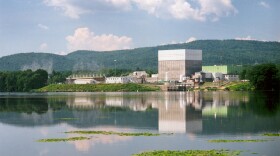A proposal from the New York State Department of Environmental Conservation to force the closure of Indian Point during periods of the summer season to cut down on fish kills is the subject of public hearings Tuesday in Westchester County. Both sides say they want to protect the Hudson River, but the methods differ.
The plan from the New York State Department of Environmental Conservation would be to shut down one or both of Buchanan-based Indian Point’s reactors for an average of 42 days from May 10 to August 10. The maximum outage could reach 92 days. The DEC calls them Fish Protective Outage Days. A DEC spokeswoman, in an e-mailed statement, says in part quote, “DEC is seeking to reduce the impact to aquatic life as part of the ongoing adjudication of Entergy's operating permits for Indian Point. As alternatives are weighed in this process, DEC has asked for a shutdown for an average of 42 days during prime fish migrations - between May 10 and August 10, as was the practice at these plants when Con Edison owned the facilities and is consistent with what has been done at other facilities on the Hudson River. This would not curtail operations this summer.” End quote.
Jerry Kremer is chairman of New York Affordable Reliable Electricity Alliance, or New York AREA, of which Indian Point parent Entergy is a member.
“This proposal is a subterfuge to close Indian Point and it’s not some environmental solution to a particular problem,” says Kremer.
Indian Point’s two reactors combined have a capacity of slightly more than 2,000 megawatts. Business and labor leaders, in opposing the DEC proposal, say the closures would result in job losses, higher electricity prices, reduced electric reliability, economic uncertainty, and negative environmental impacts. Phillip Museegas is Hudson River Program Director and attorney with environmental advocacy group Riverkeeper.
“Well, when it comes to outages or building closed-cycle cooling, in the end this is Entergy’s decision. It is up to that company,” says Museegas. “If they want to continue to operate, they’re going to have to change their operations to protect the Hudson River more than they do now. They simply cannot continue to operate Indian Point the way they’ve operated it since the 1970s and kill over a billion fish a year. The status quo is over. So, the question for them is an economic question.”
He points out the DEC proposal is an alternative to building closed-cycle cooling towers. In 2003, the DEC required Indian Point to retrofit to closed cycle cooling. In 2010, DEC denied a water quality permit, which is necessary for relicensing. Entergy is contesting that denial. Kremer says Entergy could turn to the courts again should DEC implement its proposal.
“There’s no question that any arbitrary action on the part of the DEC can be challenged in court,” says Kremer. “And then that, conceivably, because of the feelings of both sides, could probably land in the United States Supreme Court."
Again, Riverkeeper’s Museegas.
“Entergy has been fighting any kind of environmental improvements at Indian Point for over 10 years,” Museegas says. “And now they’re finally about to pay the piper and they are up in arms about it.”
Kremer says there is an alternative to DEC’s closed-cycle cooling option.
“They have proposed, in addition, that Entergy erect two Yankee Stadium-size cooling towers to be constructed along the Hudson for Indian Point,” says Kremer. “Entergy on the flipside has proposed a sophisticated wedge wire screening network to better protect the Hudson.”
An Indian Point attorney has been quoted in recent news articles saying a forced shutdown in summer months could cost ratepayers and businesses billions of dollars, and take away a key source of clean energy that would have to be replaced with power producers that cause air emissions, points contested by Riverkeeper.
Kremer is a former state assemblyman.
“Having been a 23-veteran of Albany, that this is unquestionably one of the dumbest ideas to ever come out of a state agency in the last 50 years.”
The license for Indian Point Two expired in September, but the reactor continues to operate until the Nuclear Regulatory Commission renders a decision. The license for Indian Point Three runs through December 2015.








